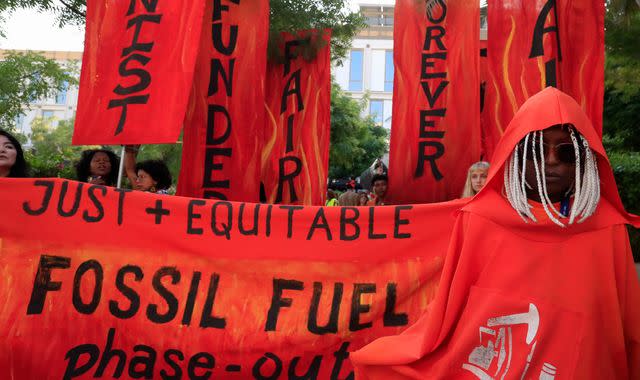COP28: OPEC oil states 'panicking' as row over plan to end fossil fuel era intensifies

Oil states are pressing the panic button after a proposal to end the fossil fuel era gathered unprecedented support at the current United Nations climate talks, according to veteran observers of the talks.
A push to "phase out" fossil fuels has gathered traction at COP28 in Dubai like never before in the nearly 30-year history of such talks.
But the push has deepened a chasm between at least 80 countries backing such a proposal, including vulnerable states like Samoa, and oil and gas producing nations like Saudi Arabia and Russia, as well as some developing economies.
The unprecedented support for a fossil fuel phase-out appeared to startle the powerful oil cartel OPEC, whose 13 members include Saudi Arabia, the UAE and Nigeria.
A letter from its head, urging members to reject language targeting fossil fuels, sent shockwaves through the COP28 summit when it was leaked last night.
The letter dated Wednesday 6 December, sent by Secretary General Haitham Al Ghais, said "the undue and disproportionate pressure against fossil fuels may reach a tipping point with irreversible consequences".
Fossil fuels are responsible for about 75% of climate change but still provide around 80% of the world's energy.
'They're scared'
The OPEC letter "indicates a whiff of panic," said Alden Meyer, of thinktank E3G.
Former Ireland President Mary Robinson said: "They're scared. I think they're worried."
Ms Robinson is now co-chair of the retired leaders group The Elders, and a prominent climate campaigner.
She said the fact OPEC is afraid "gives me hope".
Tina Stege, climate envoy for the vulnerable Marshall Islands in the Pacific, which also chairs the High Ambition Coalition group of countries at the talks, said: "Nothing puts the prosperity and future of all people on earth, including all of the citizens of OPEC countries, at greater risk than fossil fuels... which are at the root of this crisis."
The target to limit warming to 1.5C is "not negotiable, and that means an end to fossil fuels," she added.
The pressure on the COP president, Emirati Sultan Al Jaber, has now intensified, with his country an OPEC member, but bound by his COP role to find consensus and progress climate action.
Saudi Arabia and Russia pushing carbon capture
In a statement to Reuters, OPEC Secretary General Haitham Al Ghais declined to comment on the leaked letter but said OPEC wanted to keep the summit's focus on reducing climate-warming emissions, and away from their main sources like oil and gas.
"The world requires major investments in all energies, including hydrocarbons," he said. "Energy transitions must be just, fair and inclusive."
Saudi Arabia and Russia want the summit to focus on emissions from burning fossil fuels, rather than the fuels themselves.
Saudi Arabia has been leading the charge on a push to use expensive technology to capture emissions from burning the fuels and store them underground.
But such "carbon capture" projects have proved extremely difficult to get off the ground or scale up.
The UN climate science panel, the IPCC, says a small amount of carbon capture technology will be necessary to get the world to net zero emissions, but cannot take the place of reducing fossil fuel use worldwide.
Read more:
Can we decarbonise rail freight?
Why misplaced COP outrage is counterproductive
Is Dubai playing its part in battle against climate change?
Deadlock over COP29 broken at last
The summit breathed a small sigh of relief at the news the deadlock over who will host next year's COP29 summit had finally been broken.
Azerbaijan said it had stuck a late deal with longtime adversary Armenia over its bid. While some diplomats said other countries including Russia were expected to back Baku's bid, there was no official confirmation from Moscow on Friday.
Russia had also blocked bids by EU members like Bulgaria in apparent retaliation for sanctions over the war in Ukraine.
Different regions in the world take it in turns to host a COP summit, with Eastern Europe up next.


